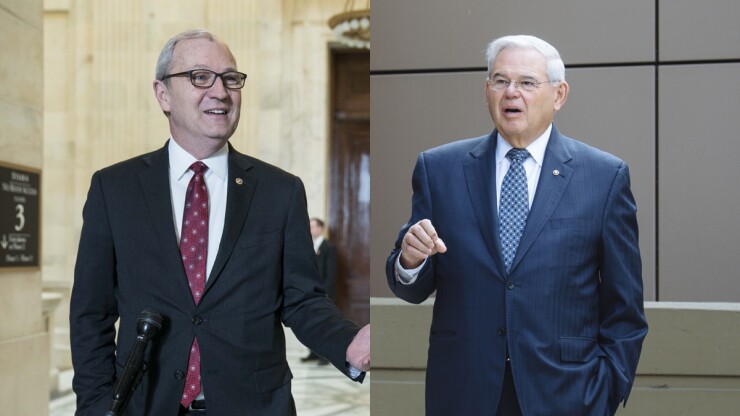The most recent legislative push to mandate cash is bipartisan at the outset, but there are divisions over how to put this plan into effect.
As the 2020 election approaches, merchants and payment processors should expect political advocacy to ensure cash, even as e-commerce and mobile payments rapidly expand. There have already been local laws passed to ban cashless stores, a movement that’s starting to go national.
Sens. Bob Menendez, D-N.J. and Kevin Cramer, R-N.D. last week introduced the
“We want to make sure folks aren’t being locked out of being able to go to stores, especially at these times,” said Menendez in an email provided by the senator's office.
Businesses that prohibit cash payments discriminate against the millions of Americans who do not have bank accounts while forcing customers to exclusively use a less secure form of payment, said Cramer in an email provided by the senator's office. “Our legislation protects people’s right to choose their preferred currency and ensures the money we print remains usable as legal tender for all debts, just as it says,” Cramer said.
These bills follow

There’s also political pressure to reduce access to cash.
The dilemma is cash is
The bills to mandate cash access exist alongside other proposals to boost access to the banking system, such as public digital wallets that could create universal access to government stimulus payments,
“There’s generally more emphasis on finding ways to include more folks in the financial system,” a Senate democratic aide with knowledge of the Menendez bill said. “What we may see is not only more stimulus but more people being shut out of financial services. That could lead to a growing reliance on cash.”
While it’s not unusual for a House or Senate bill to have bipartisan co-sponsors, the liberals and conservatives have different motivations to preserve cash, so there’s no guarantee the bills will progress.
Liberals prefer the government take a more active role to promote financial inclusion by ensuring cash access and taking more direct action such as enabling central bank digital currencies, postal banking and digital dollars. Conservatives prefer a lighter regulatory approach of opening financial services to more competitors.
“Politicians on the left and right will oppose curbs on cash because they would make it more difficult for a segment of Americans to engage in basic commerce,” said Eric Grover, a principal at Intrepid Ventures. “And some on the right will resist restrictions on cash because of its anonymity.”
Many of the state and local bills mandating cash were a response to the introduction of checkout-free stores, particularly Amazon Go.
“We’re not trying to say that stores can’t accept other forms of payment, but as the legal tender of the country they should accept cash,” Menendez added in the email.
The
“It is easy to see how guaranteeing the continued right to use cash will enjoy bipartisan support,” said Robert Hockett, a law professor at Cornell, adding both parties are concerned about the underbanked population and serving small businesses that have a hard time affording fees for electronic payments.
“On the other hand, there is the matter of financial privacy, about which most Republicans and many Democrats are concerned too. The anonymity offered by cash remains attractive to them,” Hockett said.





